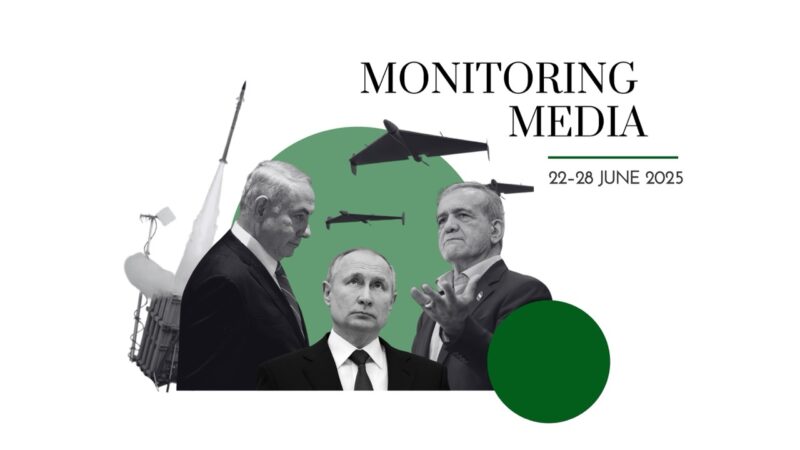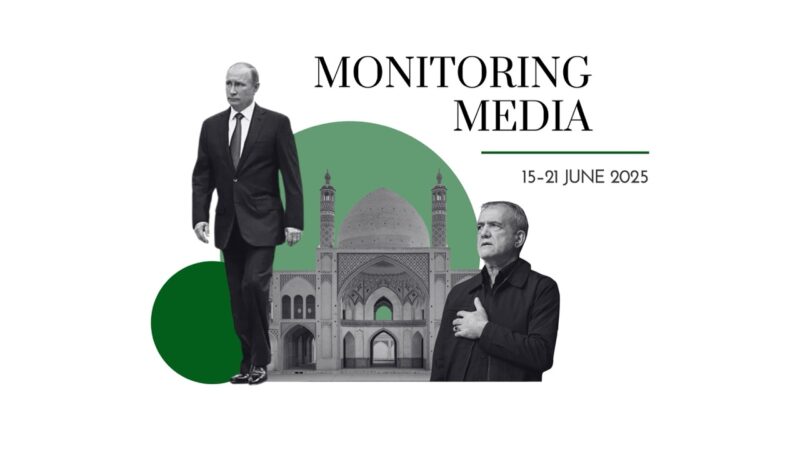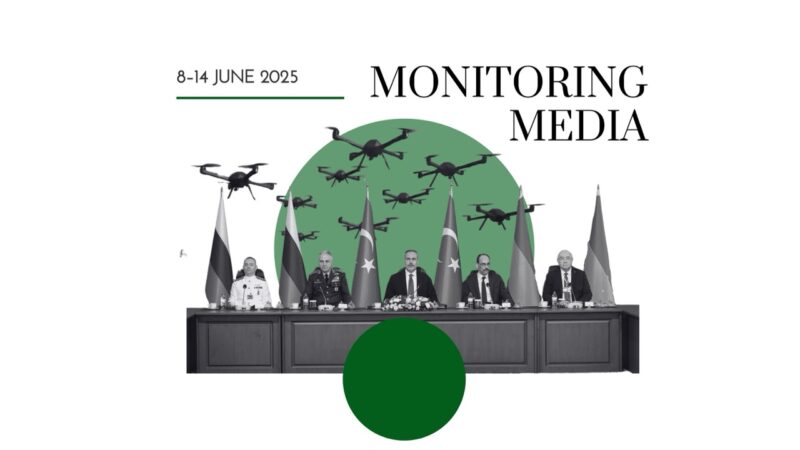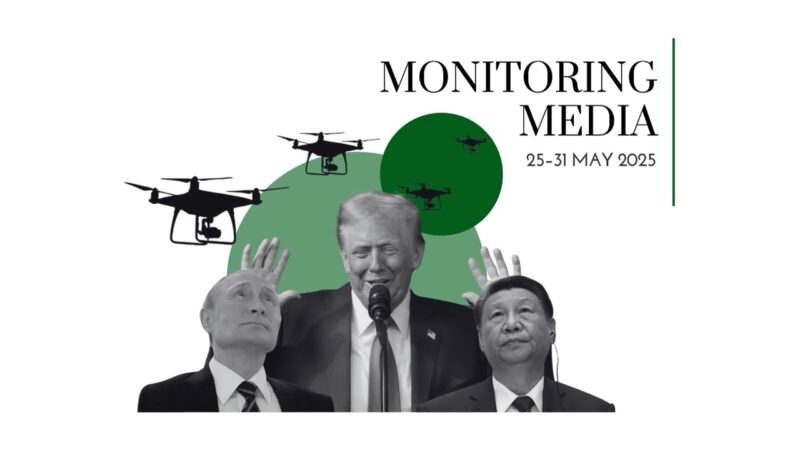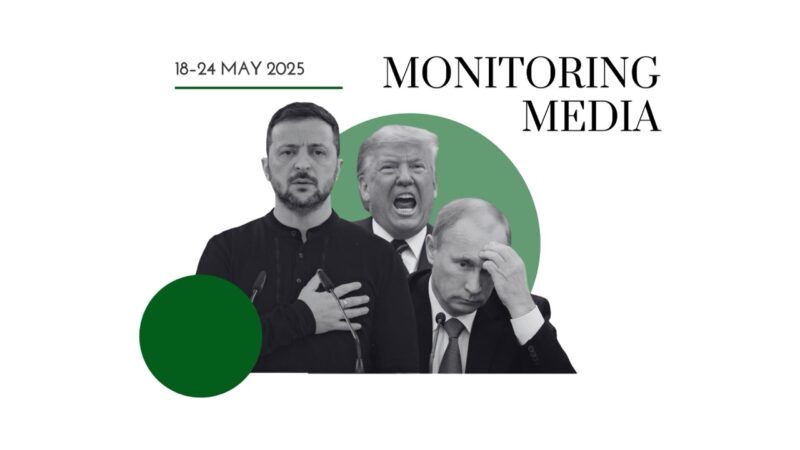Ukrainians detect suspicious satellite usage

CIUS weekly report on North American media coverage of Ukrainian affairs, 17–23 March 2024
Five publications (Foreign Policy, The Economist, The Atlantic, The Globe and Mail, and The Hill) were selected to prepare this report on how Ukraine has been portrayed in the North American press during the past week. The sample was compiled based on their impact on public opinion as well as on their professional reputation, popularity among the readership, and topical relevance. These publications represent centrist viewpoints on the political spectrum.
This MMS report covers only the most-read and relevant articles about Ukraine, as ranked by the respective North American publications themselves in the past week. Its scope covers promoted articles on home pages and articles from special sections on Ukraine, with the hashtag #Ukraine, from the paper editions of the publications, and about Ukraine from opinion columns and editorials.
Featured topics
- The world and Ukraine: technology alone will not give Ukraine a win; Ukrainians detect suspicious satellite usage;
- Russia at war: Western democracies must respond effectively to election fraud; Russia shows signs of running out of artillery.
MMS summaries
Can democracies resist rigged elections? The editorial board of the Economist emphasizes that genuine democracies must find an effective mechanism to respond to rigged elections. The lack of effective response and tacit recognition of illegitimate elections have serious consequences: “The West’s reputation as a defender of democracy is wearing thin, just as democracy is becoming rarer and less popular.” According to the authors, “dodgy elections are common: at least 28 of the 76 countries holding elections this year will not have a fully free and fair vote.” But Western democracies have limited options for responding to electoral fraud: declare them illegitimate or intervene by force. Military intervention, however, is not domestically popular. On the other hand, deeming elections illegitimate in autocratic regimes while actually continuing to cooperate with them is not effective. An example of such a situation is the presidential election in Russia: “Long before the first ballot was cast, it was clear that Vladimir Putin, the country’s dictator since 1999, would win by a predetermined, overwhelming majority.” After all, the opposition is “in exile, in jail or dead,” and in illegally occupied territories of Ukraine “voters cast their ballots at gunpoint.” Western democracies have all recognized the results of the recent Russian presidential election as illegitimate. However, despite the fact that Western states condemned it as a sham, they enabled the sham by ensuring that voting at the Russian embassies in their borders was carried out peacefully. According to the editorial board, “Genuine democracies are caught between an ideology that compels them to evangelise and the reality of an increasingly undemocratic world.”
Technology alone will not allow Ukraine to win the war. Gavin Wilde (Foreign Policy) emphasizes that drones or other tech alone will not help Ukraine break the stalemate and win the war. On the contrary, overestimating the role of technology in Russia’s war against Ukraine could solidify “the very stalemate that Ukraine needs to break.” On the eve of Russia’s full-scale invasion of Ukraine, Western analysts were wrong in their conclusions about Ukraine’s ability to defend itself precisely because they “relied too much on cataloguing Russia’s inventory of gadgetry and cyber tools and failed to account for the context, planning, and quality of the forces using them.” Moscow made similar miscalculations too. Overestimating technological advantages, Russia has directed “many of its high-tech capabilities, particularly cyber operations, less toward beating the Ukrainian armed forces and more toward immiserating Ukraine’s civilian population.” Such steps have instead strengthened the will of Ukrainians to fight Russian aggression. According to the author, both Ukraine and Russia have limited human resources and are looking for alternatives to additional conscription. But other significant aspects of war should not be overlooked, such as “planning, logistics, coordination, morale, and leadership”—especially if Ukraine’s ultimate goal is the complete expulsion of Russian occupation forces from its territory. According to Wilde, “Technology’s most alluring quality for militaries is the promise that it might somehow make the physical demands of seizing territory somehow less expensive in terms of blood, treasure, time, and labor. But no matter how much granular insight, safe distance, and speed that technology provides, it simply cannot substitute for the kinds of traditional capabilities that characterized 20th-century conflicts.”
Is there an end to Russian artillery? The editorial board of The Economist highlights the fact that despite Russia’s current firepower advantage over Ukraine, Moscow might run out of artillery by 2025. Currently, Russian guns fire about five times as many shells as Ukrainian ones. However, this advantage may disappear over time. According to the Royal United Services Institute, in February 2024 Moscow had just under 5,000 artillery pieces. Russia has only two factories, which allow it to produce “about 50 artillery-gun barrels a year.” Due to sanctions, Moscow’s ability to buy artillery abroad is minimal. And those that are in service are being actively destroyed by the Ukrainian army: according to various estimates, the number of destroyed Russian artillery ranges from 5,500 to 10,000 units. The Economist concludes, “Russia is expected to run out of barrels in 2025…at which point it will need to rely on rocket artillery, which requires far greater supplies of explosive material.”
Ukrainians detect suspicious satellite usage. Graeme Wood (Atlantic) suggests that long-range cruise missile strikes, which are one of the most expensive weapons in Russia’s non-nuclear arsenal, are aimed at Ukraine using satellite imagery provided by US companies. Kyiv certainly expected Moscow to use its satellites to launch strikes, but Ukrainians have a hard time accepting that their allies could be providing Russia with images of targets. They have detected a pattern: “A satellite snaps pictures of a site, then some days or weeks later a missile lands. Sometimes another satellite is sent to capture additional images afterward, perhaps to check the extent of the damage.” According to the author, this may be a coincidence, but there have been many similar cases: “In late January of this year, someone commissioned a commercial-satellite company to take fresh images of Kyiv, just before the city was hit by a missile barrage.” Russia buys satellite imagery through third-party companies “that do business with Western satellite-imagery companies, and that these images” could be used to continue its war against Ukraine. It is even easier and cheaper to order archived satellite images of Ukraine. According to Wood, two of the largest commercial satellite imagery companies in the US, Maxar and Planet, are also under suspicion: “Both have produced imagery of Ukrainian sites later struck by Russian missiles. Both stressed that they vet their customers diligently, and that they have observed the U.S. regulation that has forbidden transactions with Russia since the beginning of the war.” However, neither of these companies could guarantee that their clients were not in fact Russian shell companies. Therefore, according to the author, “Western governments should impose restrictions on the distribution of satellite imagery over Ukraine, ensuring access is granted only to thoroughly vetted recipients.”
China-Russia alignment should prompt the West to reconsider its strategic thinking. Carl Bildt (Globe and Mail) argues that Western strategists may be misguided in focusing on the so-called “Indo-Pacific” narrative, which aims to contain China but overlooks the strategic importance of the Eurasian perspective. While the Indo-Pacific framework emphasizes maritime dominance and containment of China, the Eurasian perspective confronts the terrestrial dominance of China and Russia over the vast Eurasian landmass. President Putin seeks to revive the Russian Empire, with Ukraine as the starting point for his aggressive campaign that is now entering its third year. Likewise, President Xi Jinping aims to establish an empire that would extend its influence across East, South, and Central Asia, invoking memories of China’s “century of humiliation.” Bildt contends that neglecting the Eurasian perspective could lead to grave consequences, as both China and Russia seek to reshape the global order through strategic alignment and expansion into Eurasia. The author concludes that to navigate the evolving geopolitical landscape effectively, “Western strategists neglect this key strategic relationship at their peril…The West urgently needs to start applying a Eurasian lens. Relying too heavily on the Indo-Pacific perspective would be a big mistake.”
Why time favours Ukraine despite shifting perspectives. Alexander J. Motyl (The Hill) remarks on a notable change in the narrative surrounding the Russo-Ukrainian war. Previously Ukraine was perceived as gaining ground while Russia appeared to be losing. A sudden reversal occurred, according to Motyl, following Ukraine’s acknowledgment of its failed counteroffensive in November, leading to a widespread belief in the inevitability of a Russian victory. Despite a defeatist sentiment rising among some Western allies, the author argues that several key factors indicate that time is actually on Ukraine’s side. Firstly, Russia is continuing to sustain significant losses, with estimates in the hundreds of thousands of casualties. This toll, coupled with rising discontent among front-line soldiers and their families, indicates a potential for internal unrest within Russia. Secondly, the Russian economy is facing mounting challenges, with military-related sectors draining resources while essential sectors experience negative growth. As economic conditions worsen and societal dissatisfaction grows, Putin’s reliance on coercion becomes increasingly tenuous. Consequently, Ukraine’s resilience and potential for international support position it favourably in the long run: “…time is on Ukraine’s side. It needs to survive the next few months, when Russia may intensify its attacks and things could get very complicated. Since Russia lacks the capacity to defeat Ukraine in so short a time, Ukraine will survive and continue destroying the Black Sea Fleet, downing Russian airplanes and preparing for a deadly assault on the Kerch Bridge.” Motyl concludes that despite Russia’s possession of weapons which are effective for harming Ukrainians and intimidating Russians domestically, they are inadequate for salvaging a regime plagued by inherent weaknesses.
